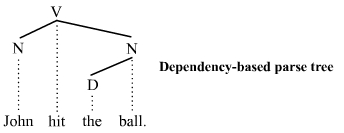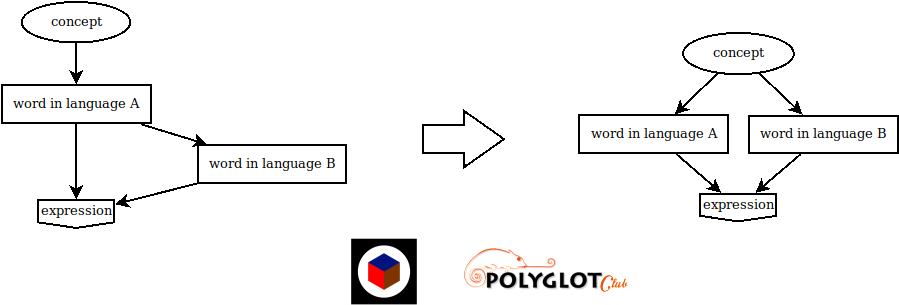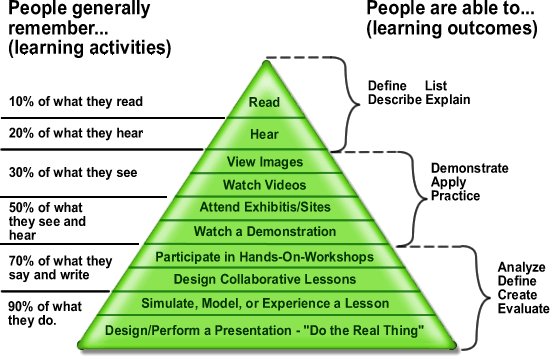Difference between revisions of "Language/Multiple-languages/Culture/How-to-become-a-polyglot"
| Line 124: | Line 124: | ||
Remember that your confidence will grow following the growth of your vocabulary. | Remember that your confidence will grow following the growth of your vocabulary. | ||
A word may have different meanings | A word may have different meanings and when you read or listen to something, it is the context that determines the word's meaning. | ||
Words in two languages are usually not one-to-one correspondent, i.e. no corresponding word in another language with the exact meanings as that one. Even if two words in two languages have the same meaning(s), their usages and frequencies are often not all the same. | |||
According to [https://wordcounter.io/blog/how-many-words-does-the-average-person-know/ Word Counter], you need to know around 40000 words to reach native speaker's vocabulary level. Assume that [[wikipedia:Pareto_principle|Pareto principle]] can be applied here, you need to mater about 8000 words to communicate fluently. | According to [https://wordcounter.io/blog/how-many-words-does-the-average-person-know/ Word Counter], you need to know around 40000 words to reach native speaker's vocabulary level. Assume that [[wikipedia:Pareto_principle|Pareto principle]] can be applied here, you need to mater about 8000 words to communicate fluently. | ||
Revision as of 09:57, 22 September 2020
One may want to be a polyglot, but has no idea about what to do.
I think it's time to provide some help.
Motivation
Why do you want to learn languages? It's a basic question, but it determines your level.
- If you mainly feel bored and want to do something in the spare time, then you can be a beginner forever. You just want to spend time, but learning language is boring at intermediate stage and requires endeavour. Thus, you probably can't make real progress.
- If you mainly want to get a better job, then you can have useful skills, but nothing more. You have a goal, so you can make progress, but you are just interested in practical things, you consider a language as a tool, so you will not dig into the languages and explore the cultures of the speakers.
- If you are mainly forced by your parents, relatives, etc., then I feel very sorry for that. I don't know how much progress you can make because it's mainly determined by your attitude. There are many ways to attract people to learn languages, but coercing is not attractive at all, so it's the worst thing to do.
- If you mainly want to touch the whole world, to make friends, to become a world citizen, can spend time on it seriously, then you may be qualified to be a nice polyglot.
Choice of Languages
Which languages do you want to learn?
- You may want to learn the easiest ones, which may have a close relationship with your native language; you also may want to learn the hardest ones, to challenge yourself.
- You may want to learn the well-known ones, which have much influence around the world; you may also want to learn the rarely-known ones, to discover distinctive cultures.
It is all up to you.
If you ask me, my opinion is: the most influential languages in the world, the most influential languages similar to my native languages, and my personal preferences.
You can try Esperanto and/or other constructed languages because they are usually made to be easy to learn. By learning an easy language, you can clearly understand the skeleton of a language. This can be helpful before you to learn a difficult language.
If you want to learn a language that is not popular for learners, you should know that the materials are relatively hard to find. You will likely have to pay for it. You even have to learn another language before learning the language you want to learn, because the speakers of the firstly-learned language have better knowledge about it, or the language you want to learn is similar to this one. Many languages have a lot of loanwords, which means that if you know the languages being borrowed, you can learn the vocabulary of them quickly.
You will also need to know how long it takes to learn a language:
https://www.rocketlanguages.com/blog/how-long-does-it-take-to-learn-a-language/
https://www.lifehack.org/851918/how-long-does-it-take-to-learn-a-language
Sequence of Learning
There is a question: Will it be easier or harder, if I learn this language first and that second, instead of learning that language first and this second?
My gut tells me yes. If you want to learn two languages with similar grammar, and the available materials are not in the same quality or not equaly friendly to beginners, it would be better to learn the one with better materials first.
In addition, the case “You even have to learn another language before learning the language you want to learn” mentioned in the above section should also be taken into consideration.
Perspective
Maybe changing the viewpoint can be better.
Many people carry the traits of their native languages when learning a new one. It may be fresh if you do this: assume that you didn't know any language. That is to say, forget how to express in your native language temporarily. Read the text in your native language, then pretend to have forgotten your native language. You will start to wonder how you can express your thoughts. If you can do this, you have changed your perspective successfully.
It is an urgent demand of making use of languages, instead of a duty to complete a school assignment. You desire to express, but you assumed yourself unable to express in any language, so you have got to accept the new one thoroughly.
Assimilation
Let's imagine a scene: You have a word list, on the one side are words in your native language, on the other side are correspondent words in a language you've never learned. If someone alters before you see the list, you won't feel unnatural at all when seeing the wrong pairs. But if you already know these words, you would quickly find the problem out.
You could accept whatever interpreted at first, however, when you are familiar to them, you will not easily accept any change. This is because you have been assimilated by native speakers.

Attitude towards Mistakes
You should reduce the impression of mistakes, so you can instantly feel the strangeness when a mistake is made. For example, when you hear “a apple”, you can immediately know what type of mistake has been made.
In the ideal situation, when you makes a mistake, it can be instantly corrected. But in reality, you will make mistakes without noticing them. You should keep a log of what mistakes you have made and what type it is, then try to prevent them.
Free or Paid
Do you want to spend money on learning languages?
You should know the limitations of free resources:
- They may not be very reliable. Also, it is harder to find out its errors if you have only one material.
- You will lack proper training, especially on speaking and writing. You can find native speakers online, but few of them have teaching skills. You can chat online, but without payment, no individual and no group can keep you practising and point out all your mistakes.
Many people become upset and quit it on their endless ineffective ways. It is clear that if you pay and pay the right ones, you will save a lot of time, and even save your determination.
But if you learn easy languages such as Esperanto, there is no much difference between the free and the paid.
Methods and Experiences
You need to be both the coach and the athlete, especially when you don't rely on paid services.
You may have heard this tone: you will succeed as long as you work hard. This is a trap. You also need good methods. There are some people that can act as a coach, take care about how you learn, for a price. But if you choose to do it on your own, you will gain more, if you are insightful.
As a coach, your methods of learning should suit your own habit and be effective. You can find other people's methods and choose the suitable ones. If you are sure that a method is wrong, abandon it and choose another one right away. When you find something hard to go through and there is no experience for you to learn from, you need to find a way on your own. And if you like, share your experience with others, even if that method failed. Also, you should watch yourself, don't goof off. Do not rely on the “word of the day” illusion. If you are really interested in learning languages, you shouldn't learn only one word or two each day.
As an athlete, you should do enough exercise. Having suitable methods is an aspect, having enough experiences is the other. An athlete can practise an action over and over again, every day. It's same with learning languages. You should practising over and over again, until you can master it.
You may find two things in pronunciation, grammar or vocabulary are similar and easy to be confused with each other. You need to pick one of them (usually the more frequently used one), try to be familiar with it and ignore the other for some time. Avoid learning easy-to-confuse things at the same time.
You may need to dig into linguistics to have a better understanding. There is a good channel for it.
There is a great finding called “forgetting curve”. It should be taken into consideration.
You can practise meditation to improve your concentration. You will be able to focus on tables of declensions, pronouns, and so on, then recall them quickly.
You also need to learn actively, so that you won't forget it easily:
(Edgar Dale's cone of learning)
There is an article on active and passive learning.
Contributing to Polyglot Club Wiki is also active learning.
Resources
If you have good tools, you will progress faster.
Language/Multiple-languages/Culture/Internet-resources-for-polyglots
Essential terms
These words are for language learning.
Language/Multiple-languages/Vocabulary/Must‐Know-Words-for-Polyglots
When you understand their meanings, you won't be frustrated by encountering unfamiliar terms from time to time.
Pronunciation
You will surely face this problem first. As you are going to be a polyglot, you need to get to know the International Phonetic Alphabet. IPA is not very hard to learn if you know the structure of oral cavity.
Language/Multiple-languages/Pronunciation/International-Phonetic-Alphabet
When dealing with sound changes, you might feel it hard to memorise the rules. Just remember: native speakers do so, because they tend to be lazy on pronouncing words. You can just let it happen: ignore sound change rules and just pronounce what it “should have been”, read faster. You will naturally realise how to be lazy and understand why they are lazy.
Vocabulary
If you do not have the determination of spending time on memorising vocabulary, you are very likely unable to learn a language well.
You must overcome the frustration of forgetting most of the words you've just learned. Don't expect to memorise them once and for all, be prepared to review every word you've met many times later. A little tip that people should have learned in primary schools: read the word 3 times, then read its meaning 1 time.
Remember that your confidence will grow following the growth of your vocabulary.
A word may have different meanings and when you read or listen to something, it is the context that determines the word's meaning.
Words in two languages are usually not one-to-one correspondent, i.e. no corresponding word in another language with the exact meanings as that one. Even if two words in two languages have the same meaning(s), their usages and frequencies are often not all the same.
According to Word Counter, you need to know around 40000 words to reach native speaker's vocabulary level. Assume that Pareto principle can be applied here, you need to mater about 8000 words to communicate fluently.
You can follow this way: find ready-made vocabulary learning resources (like Ankiweb, Memrise) and practise, when they are depleted, you can create a spreadsheet, write down all words you are not familiar with and memorise them with Anki or Mnemosyne. To find which words you are not familiar with, you can either buy an intermediate dictionary or search entry by entry on a computer according to the frequency list at Wiktionary. If want to start from basic words, you can try the Swadesh list at Wiktionary.
Dictionary
You may hesitate on choosing a dictionary. First, see which brands have good reputation; second, see what you need:
- if you are a beginner of the language, then a dictionary with 5 000-10 000 entries is enough for your current level;
- if you want to use for daily life, then a dictionary usually with 30 000-50 000 entries is enough;
- if you want the words as many as possible, then buy the thickest one, which usually have more than 100 000 entries, but you will need to spend more time on finding the entry you want as well as more money;
There is a page of the statistic of Wiktionary.
You may want to ask: when should I choose a dictionary with 10 000-30 000 or 50 000-100 000 entries? Well, if you want a bit more than these recommended numbers, you can try them.
There is an article on how to choose a dictionary.
Now you may want to memorise all words in a dictionary. Good, but that should be done after having a good command of the most frequently used words. With these words, you can start your reading and listening practice and build your confidence.
Etymology
Some materials tell you to memorise words with some interesting homonyms in your native language. This is superficial and won't help you to understand its underlying structure. Maybe it is effective, but it also has a side effect: when using these words, you can't get rid of that funny stuff in your mind.
You should pay attention to the word roots an affixes instead. This is orthodox of memorising words. You need to know how a word is assembled, and even how to assemble in this language's style.
But this only helps you to understand them. To get familiar to them, you need to memorise by rote.
Wiktionary has “Etymology” for many words in several languages.
There is already a list of English roots of Greek and Latin origin:
https://en.wikipedia.org/wiki/List_of_Greek_and_Latin_roots_in_English

Definition
There are several words with similar meanings. Which one to choose?
You should understand the difference between “translation” and “definition”. Translation is for knowing the meaning of a word, a phrase or a sentence in another language, while definition is for understanding the word and avoiding any ambiguity. Usually, definitions are written by native speakers for native speakers, so you need to read the definition in the language you are learning.
It would be very boring to search for the definition of every word. The best way is learning it through a large amount of reading with searching for the definition as a supplement.
Adposition
Adpositions are easy to know and hard to master. For example, English beginners are usually confused about the use of “on”, “in”, “at”. Then you can consult a dictionary. You may find more than 10 meanings of such a word, but don't be upset, because words with so many meanings are few.
Dictionary definition is not enough at all. You can see which adpositions have the similar meaning, and pay attention to distinguish them when you are reading.
Collocation
Collocation requires much attention. A sentence with a wrong collocation is just like a wrongly buttoned shirt. The example of “strong tea” and “powerful computer” on Wikipedia is good: https://en.wikipedia.org/wiki/Collocation
Again, a large amount of reading with searching for the definition as a supplement is the best method for it.
Number
When you learn numbers, you only know the rule of reading numbers, instead of knowing each number, because the numbers are too many. So you need more practice to get the hang of the rules of reading them.
Flashcard
When you have downloaded Anki or Mnemosyne or something else, prepare to create flashcards at the first time, maybe you don't know how to create them to learn efficiently.
My experience: meanings on the front side, word/phrase on the back side. When you see the meaning, you need to recall the word. The recall should be like this: words in the learned language -> concept -> word in the language to learn. Comparing to seeing the word and recalling its meanings, this helps you to learn the word on expression instead of recognisation, as well as recalling the word's synonyms.
Meanings should be brief as well as being commonly used. You can search a word in a dictionary, omit the unimportant meanings, then pick the first section of text in the first meaning, see if there are other meanings that appears to have relatively large difference with the meaning you just picked. You don't need to write too much on the flashcards. You will learn the similar meanings with the one you picked through reading instead of flashcard memorisation.
Sentence
Sometimes you say something correctly in grammar, but it is unnatural for native speakers. The reason is that there may be several possible ways to express an idea and the unnatural one is not commonly used. For example, if you feel hungry, you can say in English “I am hungry”, a subject-copula-predicative structure; in German, it's “Ich habe Hunger”, a subject-verb-object structure. You may use uncommon structures, but people won't easily understand. This is why you should read and listen a lot even if you are already good at the language's grammar.
You should provide words of needed parts of speech, in the correct order, to express your idea. That is to say, you should get to know the structure of the sentences. You can say you really know what a sentence means only when you know that which part is playing which role. You can get to know some syntax knowledge and the “parse tree”, then try to draw them, and induce the rules of sentence structure of a language.
There is a video about how to draw parse trees.


But notice that there are exceptions due to custom, such as “that thing is easy to do” should be “that thing is easy to be done”. Though being irregular, they are still accepted, just because they are not making much confusion.
Reading
When you are reading, you may want to read every word through your mouth. But it limits your speed. Your elementary school teacher may want you read word by word, with voice or not, but it will be inappropriate when you are already a teenager. You are potentially able to view the text line by line.
Of course, you should get all the important information of a text. Speed is secondary.
That is not to say that you should not read aloud. You should practise in both ways.
Another thing to notice is that there are a lot of material on the Internet to read, but not all of them are grammatically correct. Don't expect native speakers always speak correctly. For English, there are also a lot of non-native speakers making all kinds of mistakes on the Internet. As a result, choosing the right material to read is important. If you want to read something short, you can go to social media, but be careful that the platforms may try to manipulate you.
You may wonder what to read. You can just pick something you know well, go to the corresponding Wikipedia entry and start reading. Because you are familiar with the topic, so you can expect what vocabulary you are going to see.
If you want to go to news websites, always keep in mind that they are trying to persuade people in most cases (if not always).
Listening
You should keep listening to audios that you can understand as much as possible. When you are familiar enough with the language, you can predict words when hearing the first syllables.
Before practise listening, you should have enough knowledge of the pronunciation, vocabulary, sentence structure and also reading comprehension.
Proper names in the listening material, unless known, should be avoided as much as possible.
When you find something that you can't understand and you don't have the transcript, follow these steps:
- Slow down the recording
- Recognize each syllable
- Recognize each word
If you still failed, try some similar phonemes (with different places of articulation and less likely with different manners of articulation), such as [m] for your recognized [n], [t] for your recognized [ʔ]; maybe you have recognized an open syllable as a closed syllable, or reversely; maybe the vowel is not pronounced clearly, then you should try to recall any word with the same consonants before and after it.
If you want to listen to music, be aware that not every song's lyrics are grammatically correct, not every singer's pronunciation is standard.
Irregular rules
There may be irregular rules in a language, which takes much time to be mastered but can be avoided in other languages. This makes learners upset. In fact, when parents are teaching their children, it is also annoying for both of them, until the children get used to it. This is indeed a tragedy of the human. Kind of institutionalisation.
Keep calm and carry on.
Reality
You may have got a nice score in an exam, but it doesn't mean that you can wield it as you wish. Many people feel confident until they go abroad. They just don't know how to express instantly and precisely in diverse situations, in real life.
There are people working on learning languages through virtual reality, but for now, enough money is required:
https://www.fluentu.com/blog/virtual-reality-language-learning/
Mondly has AR for learning:
Further reading on this topic:
https://en.wikipedia.org/wiki/Virtual_world_language_learning
Viewing the Cultures
When looking back at history, you may find things primitive and dumb. But if you look along the history timeline, you can find things advanced and amazing. An example is Windows 95. You will have different opinions when comparing it with Windows 7 and Windows 1.0.
You may have learned the geography and history of a country, but you still don't totally understand the culture of it.
You will need to learn other subjects like sociology and psychology. With knowledge of these, you will even find that you have a new understanding of your own country.


